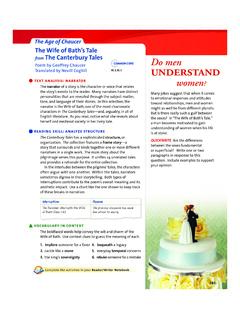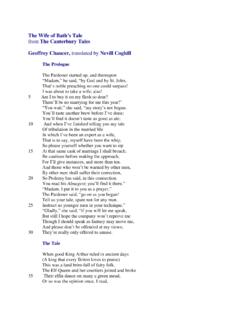Transcription of Translated by Nevill Coghill RL 3, RL 4, RL 6, RL 10 text ...
1 Power to corrupt?In the introduction to his tale, the Pardoner states, Radix malorum est cupiditas, which is Latin for The love of money is the root of all evil a passage from the Bible. The expression suggests that the desire for riches often seduces people into abandoning their moral principles. Today, as in chaucer s time, greed and other elements of human weakness often trigger grave acts of With a small group of classmates, list several examples of corruption. Discuss the factors that you think prompted people to commit corrupt acts. Compare your conclusions with those of other groups. from The Pardoner s Talefrom The Canterbury TalesPoem by geoffrey ChaucerTranslated by Nevill Coghill text analysis: exemplumAn exemplum is a short anecdote or story that illustrates a particular moral point.
2 Developed in the late Middle Ages, this literary form was often used in sermons and other didactic literature. One famous example is chaucer s The Pardoner s Tale, which focuses on the subject of greed. As you read the selection, pay attention to the actions of the characters and to the narrator s description of his own practices. Review: Irony reading skill: predictWhen you predict, you make guesses about what will happen next in a story based on text clues and your own prior knowledge. Predicting helps you become engaged in the story and motivates you to read on. To make predictions about The Pardoner s Tale, use the following strategies: Note foreshadowing, or hints about future plot events. Think about the words, actions, and personalities of the three rioters to predict their behavior throughout the you read, record your predictions and any helpful text clues in a chart like the one shown.
3 Later, complete the chart by explaining the actual outcomes of the story s CluesOutcomesThe rioters will experience tavern boy warns them about the plague. vocabulary in contextTo see how many vocabulary words you already know, substitute a different word for each boldfaced term. 1. The miser demonstrated his avarice by amassing coins. 2. She used harsh words to castigate his awful behavior. 3. The two enemies came together for a secret the activities in your Reader/Writer Age of ChaucerWhat has theExamples of Corruption1. Corporate scandals2. the canterbury tales 169RL 3, RL 4, RL 6, RL 16912/15/10 7:30:06 PM12/15/10 7:30:06 PM170 unit 1: the anglo-saxon and medieval periods My lords, he said, in churches where I preachI cultivate a haughty kind of speechAnd ring it out as roundly as a bell;I ve got it all by heart, the tale I have a text, it always is the sameAnd always has been, since I learnt the game,Old as the hills and fresher than the grass,Radix malorum est cupiditas.
4 I preach, as you have heard me say before,And tell a hundred lying mockeries take great pains, and stretching out my neckTo east and west I crane about and peckJust like a pigeon sitting on a hands and tongue together spin the yarnAnd all my antics are a joy to curse of avarice and cupidityIs all my sermon, for it frees the come the pence, and specially for myself,For my exclusive purpose is to winAnd not at all to castigate their dead what matter how their souls may fare?They can go blackberrying, for all I care! .. And thus I preach against the very viceI make my living out of avarice. aAnd yet however guilty of that sinMyself, with others I have power to winThem from it, I can bring them to repent;But that is not my principal pardoner s prologue geoffrey chaucer 510152025background In the medieval church, a pardoner was a clergy member who had authority from the pope to grant indulgences certificates of forgiveness to people who showed great charity.
5 In practice, however, many pardoners such as chaucer s pilgrim were unethical and sold their certificates to make money for the church or themselves. a PREDICTThe Pardoner convinces people to buy certificates of forgiveness by reciting his moral stories. What can you predict about the characters and events of the tale he will tell?8 Radix malorum est cupiditas (r PdGks m -l rPEm DstQ kL-pGdPG-t sQ): Latin for The love of money is the root of all evil (1 Timothy 6:10).10 mockeries: false pelf: riches. 18 pence: pennies. Analyze VisualsWhat details in this image reflect the Pardoner s description of his preaching?avarice (BvPE-rGs) n. greedcastigate (kBsPtG-gAtQ) v. to 17011/22/10 12:19:08 PM11/22/10 12:19:08 17111/22/10 12:19:17 PM11/22/10 12:19:17 PM172 unit 1: the anglo-saxon and medieval periods Covetousness is both the root and stuffOf all I preach.
6 That ought to be enough. Well, then I give examples thick and fastFrom bygone times, old stories from the yokel mind loves stories from of old,Being the kind it can repeat and ! Do you think, as long as I can preachAnd get their silver for the things I teach,That I will live in poverty, from choice?That s not the counsel of my inner voice!No! Let me preach and beg from kirk to kirkAnd never do an honest job of work,No, nor make baskets, like St. Paul, to gainA livelihood. I do not preach in s no apostle I would counterfeit;I mean to have money, wool and cheese and wheatThough it were given me by the poorest ladOr poorest village widow, though she hadA string of starving children, all agape. bNo, let me drink the liquor of the grapeAnd keep a jolly wench in every town!
7 But listen, gentlemen; to bring things downTo a conclusion, would you like a tale?Now as I ve drunk a draft of corn-ripe ale,By God it stands to reason I can strikeOn some good story that you all will though I am a wholly vicious manDon t think I can t tell moral tales. I can!Here s one I often preach when out for winning.. 303540455055b IRONYR eview lines 39 47. Why does the Pardoner tell his moral stories? Explain how his motive is ironic, or different from what you might have expected. 39 kirk: yokel: St. Paul: a follower of Jesus Christ who made baskets and counterfeit: vicious: immoral; 17211/22/10 12:19:22 PM11/22/10 12:19:22 PM the canterbury tales 173It s of three rioters I have to tellWho, long before the morning service bell,Were sitting in a tavern for a as they sat, they heard the hand-bell clinkBefore a coffin going to the grave;One of them called the little tavern-knaveAnd said Go and find out at once look spry!
8 Whose corpse is in that coffin passing by;And see you get the name correctly too. Sir, said the boy, no need, I promise you;Two hours before you came here I was was a friend of yours in days of old,And suddenly, last night, the man was slain,Upon his bench, face up, dead drunk came a privy thief, they call him Death,Who kills us all round here, and in a breathHe speared him through the heart, he never then Death went his way without a s killed a thousand in the present plague,And, sir, it doesn t do to be too vagueIf you should meet him; you had best be on your guard with such an adversary,Be primed to meet him everywhere you go,That s what my mother said. It s all I know. The publican joined in with, By St. Mary,What the child says is right; you d best be wary,This very year he killed, in a large villageA mile away, man, woman, serf at tillage,Page in the household, children all there , I imagine that he lives round s well to be prepared in these alarms,He might do you dishonor.
9 Huh, God s arms! cThe rioter said, Is he so fierce to meet?I ll search for him, by Jesus, street by s blessed bones! I ll register a vow!60657075808590 The pardoner s tale86 page: boy privy (prGvPC): hidden; Bubonic plague killed at least a quarter of the population of Europe in the mid-14th publican: innkeeper; tavern EXEMPLUMMany characters in moral stories are allegorical that is, they stand for abstract ideas, such as virtue and beauty. Identify the allegorical character presented in lines 72 89. Who fears him? Why?58 rioters: rowdy people; 62 hand-bell .. grave: In chaucer s time, a bell was carried beside the coffin in a funeral tavern-knave (nAv): a serving boy in an 17311/22/10 12:19:23 PM11/22/10 12:19:23 PM174 unit 1: the anglo-saxon and medieval periods Here, chaps!
10 The three of us together now,Hold up your hands, like me, and we ll be brothersIn this affair, and each defend the others,And we will kill this traitor Death, I say!Away with him as he has made awayWith all our friends. God s dignity! Tonight! They made their bargain, swore with appetite,These three, to live and die for one anotherAs brother-born might swear to his born up they started in their drunken rageAnd made towards this village which the pageAnd publican had spoken of and grisly were the oaths they swore,Tearing Christ s blessed body to a shred; If we can only catch him, Death is dead! dWhen they had gone not fully half a mile,Just as they were about to cross a stile,They came upon a very poor old manWho humbly greeted them and thus began, God look to you, my lords, and give you quiet!










